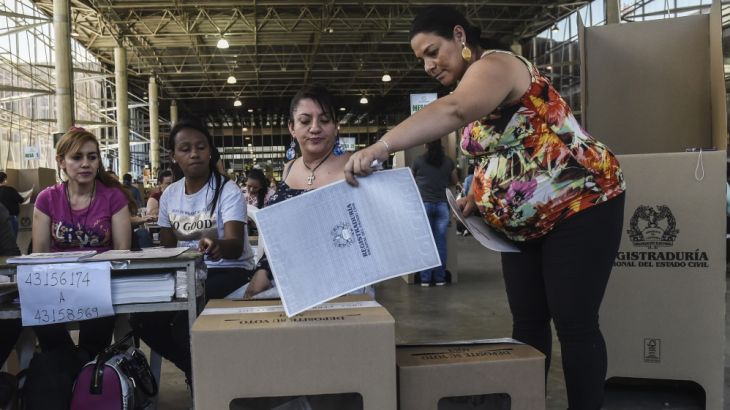Colombia: FARC performs poorly in first electoral test
Conservative parties, who opposed the 2016 peace deal with the FARC, take lead in parliamentary elections.

Colombia’s conservative parties came out ahead in Sunday’s parliamentary elections, but failed to get a majority in a landmark vote that saw the participation of the former leftist group, now a political party, for the first time.
With more than 90 percent of the votes counted, right-wing parties received the most seats.
Keep reading
list of 4 itemsColombia agrees with ELN rebel group to extend truce
Amid uptick in kidnappings, Colombian family receives ‘biggest gift of all’
Her son was killed by the Colombian military. Now, she’s getting an apology
The success of the conservative parties, which were opposed to the 2016 peace deal with the rebel group, raises questions about the future of the agreement.
After disbanding last year, the Revolutionary Armed Forces of Colombia (FARC) converted to a political party with the same initials.
As expected, the FARC performed poorly in the Sunday’s election, garnering less than 0.4 percent of the vote for Senate and less than 0.3 percent in the lower house. As part of the peace agreement, the party is guaranteed 10 seats.
Former President and Senator Alvaro Uribe’s Centro Democratico party won the most seats. Uribe was a vocal opponent of the 2016 peace deal.
Centrist and leftist parties polled well, keeping the right-wing parties from receiving a majority.
Presidential primaries
Colombians also voted for candidates from the right-wing and leftist coalitions to represent them in May’s presidential election.
Ivan Duque from Uribe’s party and left-wing politician Gustavo Petro, a former mayor of Bogota, won the parties’ primaries.
Local media reported that just over 41 percent of eligible voters participated in Sunday’s election. Final official results are expected later on Monday.